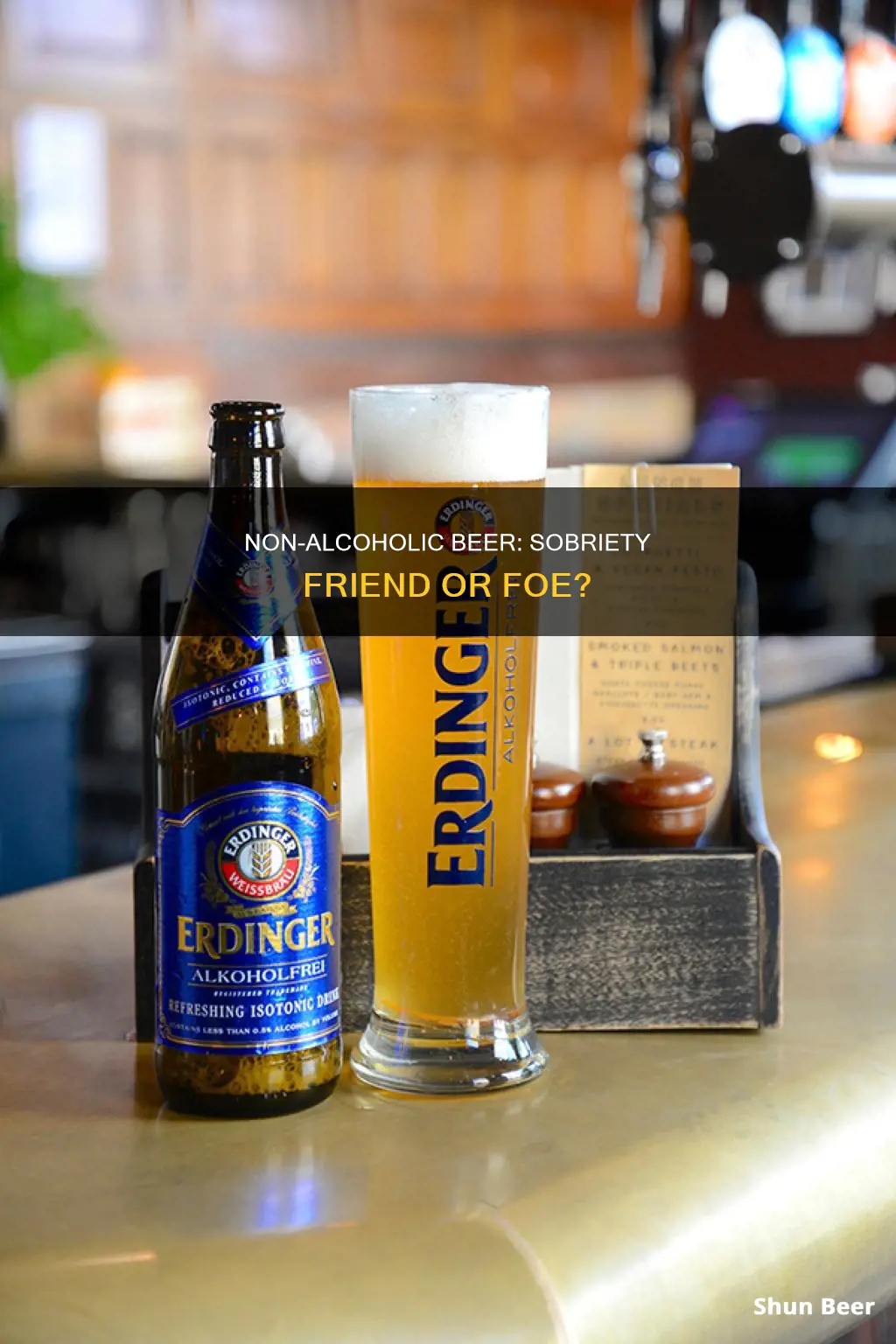
Non-alcoholic beer has gained popularity as a possible alternative for those recovering from alcohol addiction. However, the question of whether consuming non-alcoholic beer breaks sobriety remains a subject of debate. Sobriety, in the context of alcohol addiction recovery, refers to abstaining from alcoholic beverages to maintain a sober lifestyle and avoid the negative consequences of alcohol abuse. While non-alcoholic beer typically contains minimal or no alcohol, it may still contain up to 0.5% alcohol by volume (ABV) due to legal definitions. This raises concerns about whether it can trigger cravings or emotional associations for individuals with a history of alcohol addiction, potentially impacting their sobriety journey. The decision to consume non-alcoholic beer during recovery depends on individual circumstances, and it is crucial to evaluate the psychological implications and seek professional guidance when needed.
| Characteristics | Values |
|---|---|
| Definition of Sobriety | Abstaining from consuming alcoholic beverages entirely |
| Definition of Non-Alcoholic Beer | A beverage that contains very minimal or no alcohol, typically below 0.5% ABV |
| Pros of Non-Alcoholic Beer | Allows individuals in recovery to navigate social situations without feeling left out, provides a sense of normalcy and inclusivity, enables individuals to enjoy the taste of beer while maintaining sobriety |
| Cons of Non-Alcoholic Beer | May trigger cravings or emotional associations for individuals with a history of alcohol addiction, the placebo effect can lead to sensations or emotions similar to alcohol consumption, may blur the lines or increase the risk of relapse |
| Opinions from Sobriety Coaches | Differing views, some advocate for complete abstinence, while others recognize it as a potential harm-reduction tool when consumed responsibly |
| Opinions from Recovering Alcoholics | Some find it helpful to feel included during social occasions, while others prefer to avoid any reminders of past struggles with alcohol addiction |
| Factors to Consider | Personal circumstances, motivations, triggers, goals, and the potential impact on the individual's journey to lasting sobriety |
What You'll Learn

Non-alcoholic beer: a valuable alternative for people looking to moderate their alcohol intake
Non-alcoholic beer has gained traction in recent years as a viable option for those looking to moderate their alcohol consumption. It offers an opportunity for individuals to enjoy the taste and social experience of beer without the intoxicating effects of alcohol. This is especially beneficial for those in recovery from alcohol addiction or those who choose not to consume alcohol for various reasons, be it health concerns, religious beliefs, or personal preferences. Understanding the process of making non-alcoholic beer, its pros and cons, and its potential impact on sobriety can help individuals make informed decisions about their alcohol consumption.
Understanding Non-Alcoholic Beer
Non-alcoholic beer, also known as NA beer or alcohol-free beer, is designed to mimic the taste, aroma, and appearance of traditional beer while containing minimal or no alcohol. Various brewing processes are employed to reduce the alcohol content below the legal definition of an alcoholic beverage, typically 0.5% alcohol by volume (ABV) or lower. This can be achieved through methods such as vacuum distillation, reverse osmosis, or the use of specialised yeast strains that produce minimal alcohol during fermentation.
The Benefits of Non-Alcoholic Beer
Non-alcoholic beer provides several advantages for those looking to moderate their alcohol intake. Firstly, it offers an alternative for individuals who want to enjoy the taste of beer without the effects of intoxication. This is particularly beneficial for those who once considered themselves beer connoisseurs but now wish to keep their sobriety attainable. Secondly, in social situations where alcohol is present, non-alcoholic beer can help individuals feel included without compromising their commitment to sobriety. It provides a sense of normalcy and inclusivity, allowing people to navigate social gatherings without feeling left out or pressured to consume alcoholic beverages. Additionally, non-alcoholic beer is often made from natural ingredients and contains fewer preservatives and added sugars than its alcoholic counterpart, making it a healthier option.
The Drawbacks of Non-Alcoholic Beer
Despite its benefits, non-alcoholic beer also has some potential drawbacks. One of the main concerns is the presence of trace amounts of alcohol. Labels may indicate specific alcohol content, but research suggests that many non-alcoholic beers contain higher levels of alcohol than declared. This can be problematic for those in recovery from alcohol addiction, as even small amounts of alcohol can be triggering. The act of consuming a beverage that resembles beer can evoke a placebo response, leading to sensations or emotions similar to those associated with alcohol consumption. Additionally, the smell, taste, and ritual associated with non-alcoholic beer may stimulate the reward centres of the brain, triggering cravings and potentially leading to a relapse.
Non-Alcoholic Beer and Sobriety
The impact of non-alcoholic beer on sobriety is a subjective matter that depends on individual circumstances. For some, non-alcoholic beer provides a valuable tool to navigate social situations and maintain their commitment to sobriety. It allows them to feel included and reduces feelings of isolation without compromising their recovery journey. However, for others, the presence of any amount of alcohol or the sensory experience of non-alcoholic beer may be triggering and increase the risk of relapse. It is crucial for individuals to assess their own physical and emotional triggers and consult with healthcare professionals or support groups to determine if non-alcoholic beer aligns with their definition of sobriety and long-term well-being.
In conclusion, non-alcoholic beer can be a valuable alternative for people looking to moderate their alcohol intake. It offers an opportunity to enjoy the taste and social experience of beer without intoxication. However, individuals must carefully consider their unique circumstances, triggers, and goals when deciding whether non-alcoholic beer aligns with their definition of sobriety and their journey towards a healthier and happier life.
Beer and Pregnancy Tests: What You Need to Know
You may want to see also

The dangers of non-alcoholic beer for those in recovery
Non-alcoholic beer has gained traction in recent years as a viable alternative for individuals who want to enjoy the taste of beer without the intoxicating effects of alcohol. It is designed to taste, look, and feel like traditional beer while containing minimal or no alcohol. However, for those in recovery from alcohol addiction, there are several dangers associated with consuming non-alcoholic beer.
The Presence of Alcohol
Firstly, it is important to understand that non-alcoholic beer is not entirely free of alcohol. In many countries, including the United States, for a beverage to be considered non-alcoholic, it must contain 0.5% alcohol by volume (ABV) or lower. While this amount is significantly lower than that found in regular beer, it is still alcohol. For individuals in recovery who aim to abstain from consuming any alcoholic beverages, this small amount of alcohol may be enough to trigger a relapse.
Triggers and Cravings
The smell, taste, and appearance of non-alcoholic beer closely resemble those of traditional beer. This similarity can be a powerful trigger for individuals in recovery. The act of consuming a beverage that resembles beer can evoke a placebo response, leading to sensations and emotions associated with alcohol consumption. The sound of cracking open a can, the aroma of malt, or the feel of a cold glass in one's hand can stimulate the release of dopamine in the brain, triggering cravings and reminding individuals of past drinking experiences. This can ultimately jeopardize their sobriety.
Euphoric Recall
Indulging in a non-alcoholic beer can trigger "euphoric recall," a selective memory phenomenon where individuals romanticize their previous drinking experiences, forgetting the negative consequences and the havoc alcohol wreaked on their lives. This can weaken their commitment to sobriety and lead them to question their ability to drink in moderation.
Blurring the Lines of Sobriety
The very concept of non-alcoholic beer can blur the lines of sobriety. For some, it may provide a valuable alternative to moderate alcohol intake, while for others, it may be seen as an excuse to continue drinking for those not genuinely committed to their recovery. The availability of non-alcoholic options can make it challenging for individuals in recovery to set clear boundaries and maintain their commitment to abstinence.
Individual Variability
The impact of non-alcoholic beer on an individual's recovery journey can vary. While some may find it helpful to navigate social situations without compromising their sobriety, others may feel that any beverage resembling alcohol increases their risk of relapse. Each person in recovery must consider their unique circumstances, triggers, and motivations when deciding whether non-alcoholic beer aligns with their definition of sobriety.
In conclusion, while non-alcoholic beer can provide a sense of normalcy and inclusivity in social situations, it also poses significant dangers for those in recovery from alcohol addiction. The potential presence of alcohol, triggers, euphoric recall, and blurred lines of sobriety are all factors that individuals must carefully consider before incorporating non-alcoholic beer into their journey. The decision to consume non-alcoholic beer should be made in consultation with healthcare professionals and support groups, ensuring that it aligns with an individual's recovery goals and long-term well-being.
Enjoying Beer on Naples Beach: What You Need to Know
You may want to see also

The pros of non-alcoholic beer for alcoholics
For those in recovery from alcohol addiction, non-alcoholic beer can be a double-edged sword. While it may provide a sense of normalcy and help individuals navigate social situations where alcohol is present, it could also trigger cravings and emotional associations with alcohol. Ultimately, the decision to consume non-alcoholic beer during sobriety is a personal one and should be made in consultation with healthcare professionals and support groups. Here are some pros of non-alcoholic beer for individuals in recovery from alcohol addiction:
Social Inclusion
Non-alcoholic beer allows individuals in recovery to participate in social gatherings without feeling left out or pressured to consume alcoholic beverages. It provides a sense of normalcy and inclusivity, enabling them to enjoy the taste and experience of beer while maintaining their commitment to sobriety.
Nutrition
Non-alcoholic beer contains essential vitamins, minerals, fiber, and antioxidants, including B vitamins, calcium, potassium, zinc, selenium, and iron. These nutrients can contribute to overall health and well-being during the recovery process.
Rehydration
Unlike alcoholic beer, which has a diuretic effect and can lead to dehydration, non-alcoholic beer has been found to have better rehydration properties. Studies show that non-alcoholic beer with 2% alcohol or less does not increase urine output and has no impact on blood volume levels after exercise, supporting the body's fluid balance and rehydration.
Cardiovascular Health
Non-alcoholic beer is believed to have beneficial effects on cardiovascular health due to its polyphenol content, particularly polyphenol xanthohumol, derived from hops. Consuming non-alcoholic beer can help reduce blood pressure, inflammation, and homocysteine levels, as well as increase endothelial progenitor cells, which repair and maintain the endothelial walls of blood vessels.
Sleep Promotion
The compounds xanthohumol and myrcenol in hops, a key ingredient in non-alcoholic beer, have a sedative effect and are thought to improve sleep patterns. Studies have shown that drinking non-alcoholic beer in the evening can help individuals fall asleep faster and experience less restlessness during the night, promoting better sleep quality.
Stress Reduction
In addition to improving sleep, the hops in non-alcoholic beer have been found to reduce feelings of anxiety and stress. Experimental studies have shown that consuming non-alcoholic beer can lead to lower self-reported levels of anxiety and stress, as well as decreased urinary levels of 5-HIAA, a compound associated with anxiety disorders.
While non-alcoholic beer offers these potential benefits, it is crucial for individuals in recovery to carefully consider their unique circumstances, triggers, and physical and emotional responses before incorporating it into their journey towards sobriety.
Drinking Beer in Public: What's Legal in Florida?
You may want to see also

The cons of non-alcoholic beer for those in recovery
Non-alcoholic beer has gained traction as a potential option for those in recovery from alcohol addiction. However, there are several drawbacks and risks associated with its consumption in this context. Here are some of the cons of non-alcoholic beer for individuals in recovery:
Presence of Alcohol and Potential Health Risks
Despite being labelled as "non-alcoholic", these beverages often contain trace amounts of alcohol. In many countries, the legal threshold for a drink to be considered non-alcoholic is 0.5% alcohol by volume (ABV) or lower. Even at this low concentration, non-alcoholic beer is still alcohol, and for those in recovery, this can be a significant concern. Additionally, research has indicated that some non-alcoholic beers may contain higher levels of alcohol than declared on their labels, with one study finding that 30% of tested beverages exceeded the stated amount. This discrepancy can pose a risk for individuals in recovery who are aiming for complete abstinence.
Trigger for Relapse
The smell, taste, and overall sensory experience of non-alcoholic beer closely resemble that of regular beer. This similarity can trigger powerful associations and cravings in individuals with a history of alcohol addiction, potentially leading to a relapse. The act of consuming a beverage that resembles beer can evoke a placebo response, triggering sensations and emotions similar to those associated with alcohol consumption. For those in recovery, navigating triggers and managing cravings are essential aspects of maintaining sobriety. The presence of non-alcoholic beer may blur the lines and increase the risk of relapse, especially if it evokes "euphoric recall", where individuals selectively remember the positive aspects of drinking while forgetting the negative consequences.
Psychological Impact
The consumption of non-alcoholic beer can have psychological implications for those in recovery. The placebo effect can come into play, where the act of drinking a beer-like beverage triggers expectations and sensations that mirror those of alcohol consumption. This can have both positive and negative effects, depending on the individual's mindset and intentions. For some, it may evoke feelings of inclusion and normalcy, while for others, it may remind them of past drinking experiences, triggering cravings and placing their sobriety at risk. It is crucial for individuals in recovery to assess their personal triggers and determine if non-alcoholic beer aligns with their unique recovery journey.
Conflicting Perspectives in the Recovery Community
The recovery community, including sobriety coaches and recovering alcoholics, holds differing opinions on non-alcoholic beer. Some coaches advocate for complete abstinence from any beverage resembling alcohol, arguing that it may increase the risk of relapse. Others take a more moderate approach, recognizing non-alcoholic beer as a potential harm-reduction tool when consumed responsibly. Recovering alcoholics also have diverse viewpoints, with some finding NA beer helpful for social inclusion, while others prefer to avoid any reminders of their past struggles. This conflicting advice can make it challenging for individuals in recovery to make an informed decision about whether non-alcoholic beer is a safe choice for them.
Potential for Slippery Slope
The decision to consume non-alcoholic beer can be a slippery slope for individuals in recovery. While it may start as a way to feel included in social situations, it can potentially lead to a desire for stronger drinks or a return to drinking full-alcohol products. The sensation of cracking open a can, the aroma, or the feel of a cold glass in one's hand can stimulate the reward centres of the brain, triggering cravings for the real thing. For a recovered addict, trying to drink imitation alcoholic beverages can be like playing with fire, as it may lead to a devastating relapse.
Beer and Broken Bones: What's Safe to Drink?
You may want to see also

The placebo effect and sobriety
The placebo effect can play a significant role in the psychological implications of drinking non-alcoholic beer. The act of consuming a beverage that resembles beer can trigger a placebo response, leading people to experience sensations or emotions similar to those associated with alcohol consumption. This phenomenon can have both positive and negative effects, depending on the individual's mindset and intentions.
The placebo effect is more than just positive thinking or believing a treatment will work. It involves creating a stronger connection between the brain and body and how they work together. While placebos won't cure physical ailments like high cholesterol or tumours, they can influence symptoms modulated by the brain, such as pain, stress-related insomnia, and cancer treatment side effects like fatigue and nausea.
Research has shown that under the right circumstances, a placebo can be as effective as traditional treatments. For example, in a study on migraine pain medication, participants who took a placebo labelled as such experienced a 50% reduction in pain compared to a control group that took nothing. This highlights the power of the ritual of taking medicine and the positive healing effect it can have on the mind and body.
The impact of non-alcoholic drinks on alcohol cravings, particularly for those with a tendency towards addiction, is an area that requires further study. While non-alcoholic drinks may help satisfy the taste for alcohol and reduce cravings, there is also a risk that they could trigger cravings and remind individuals of past drinking experiences, potentially jeopardising their sobriety.
Ultimately, the decision to consume non-alcoholic beer during sobriety is a personal one. Each individual must consider their unique circumstances, triggers, and goals when deciding if it aligns with their definition of sobriety. Consulting with healthcare professionals and seeking support from the recovery community can aid in making an informed choice that supports long-term well-being.
Drinking Beer in Front of Cops: Is it Legal?
You may want to see also
Frequently asked questions
Sobriety refers to abstaining from consuming alcoholic beverages entirely. It involves making a conscious decision to avoid alcoholic drinks and recognizing the detrimental effects they can have on one's health, relationships, and overall quality of life.
Non-alcoholic beer, also known as NA beer or alcohol-free beer, is designed to taste and look like traditional beer but contains little to no alcohol. It is typically produced by removing alcohol from regular beer through various processes such as vacuum distillation or reverse osmosis.
The answer to this question is subjective and depends on individual circumstances. While non-alcoholic beer can provide a sense of inclusion and normalcy for those in recovery, it may also trigger cravings and emotional associations related to past drinking experiences. Each person in recovery must evaluate their unique triggers and consult with professionals to determine if non-alcoholic beer aligns with their definition of sobriety and their recovery journey.







